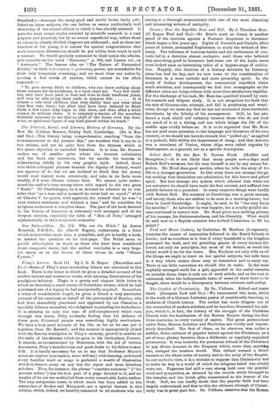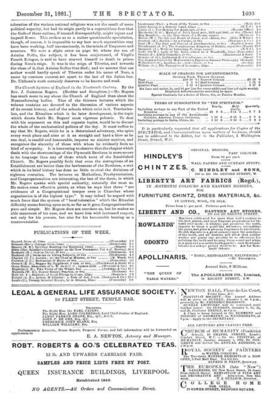The Conflict of Christianity. By Dr. Uhlhorn. Edited and trans-
lated. (Sampson Low and Co.)—We recommend this book, which is the work of a German Lutheran pastor of considerable learning, to students of Church history. The author has made diligent use of the researches of modern scholars, and he has thus illustrated his sub- ject, which is, in fact, the history of the struggle of the Christian Church with the heathenism of the Roman Empire during the first three centuries, in every variety of aspect. The great persecutions under Nero, Marcus Aurelius, and Diocletian are vividly and impres- sively described. The first of these, as he observes, was rather a sudden, fierce outburst of popular hatred against the Christians, as a set of sour, gloomy fanatics, than a deliberate or regularly organised persecution. It was, however, the persistent refusal of the Christians to pay divine honoura to the Emperor which, more than anything else, enraged the heathen world. This refusal seemed a direct menace to the whole order of society and to the unity of the Empire. Iu our author's view, it is a mistake to suppose that Christianity had to make its way in a world of which the religions belief was utterly worn out. Paganism had still a very strong hold over the popular mind and sympathies, as attested by the crowds which thronged to the temples, and the lavish gifts consecrated to the honour of the Gods. Still, we can hardly doubt that the popular faith had been largely undermined, and that to this the ultimate triumph of Christi- anity was in great part due. Dr. Uhlhorn observes that the Roman toleration of the various national religions was not the result of mere political sagacity, but had its origin partly in a superstitious fear that the Gods of these nations, if treated disrespectfully, might injure and imperil Rome. This strikes us as a rather questionable speculation, though, of course, it is impossible to say how much superstition may have been working, half unconsciously, in the minds of Emperors and senators. We note a slight error on page 80, where the son of Asinins Polio, the subject, it has been conjectured, of Virgil's - Fourth Eclogue, is said to have starved himself to death in prison during Nero's reign. It was in the reign of Tiberius, and towards the close of it, that Asinius Gallus thus died ; and we assume that our author would hardly speak of Tiberius under his name of Nero, a name by common consent set apart to the last of the Julian line. Dr. Uhlhorn's work certainly deserves to be known and read.







































 Previous page
Previous page